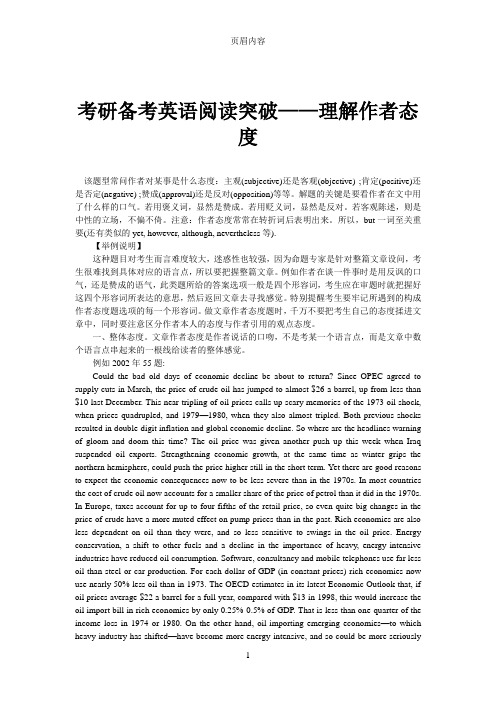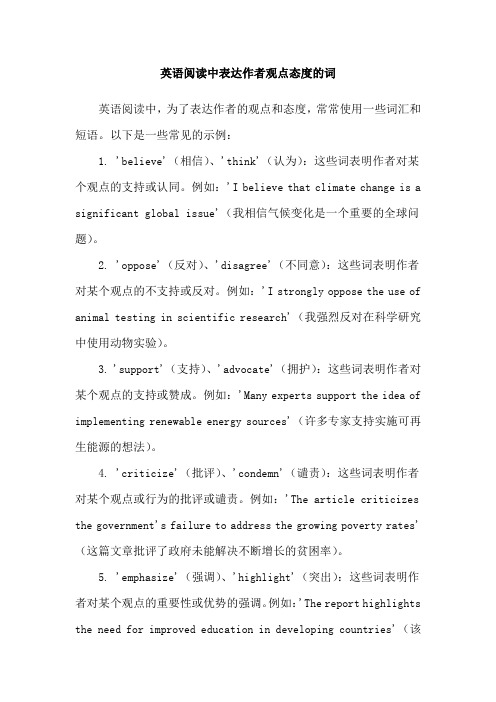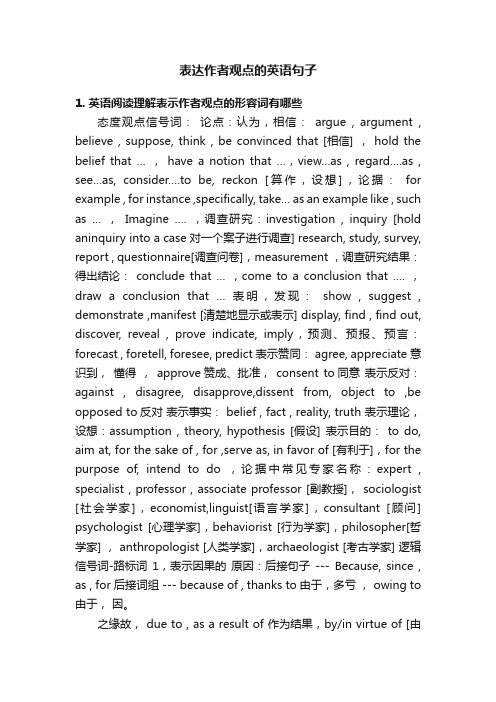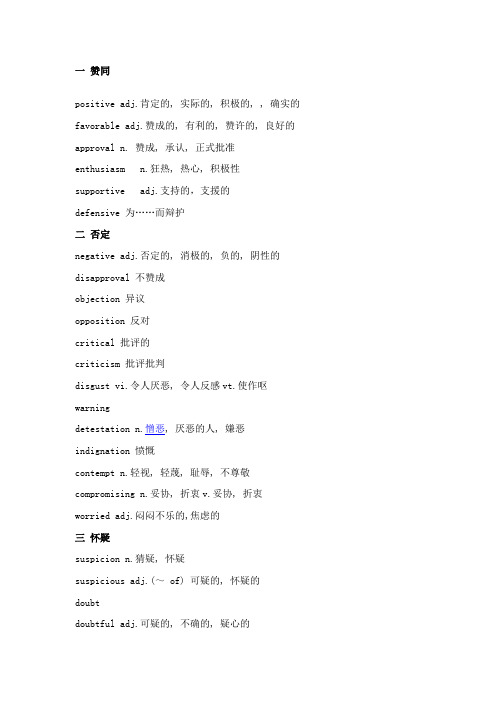英语阅读中表达作者观点态度的词
考研备考英语阅读突破——理解作者态度

考研备考英语阅读突破——理解作者态度该题型常问作者对某事是什么态度:主观(subjective)还是客观(objective) ;肯定(positive)还是否定(negative) ;赞成(approval)还是反对(opposition)等等。
解题的关键是要看作者在文中用了什么样的口气。
若用褒义词,显然是赞成。
若用贬义词,显然是反对。
若客观陈述,则是中性的立场,不偏不倚。
注意:作者态度常常在转折词后表明出来。
所以,but一词至关重要(还有类似的yet, however, although, nevertheless等).【举例说明】这种题目对考生而言难度较大,迷惑性也较强,因为命题专家是针对整篇文章设问,考生很难找到具体对应的语言点,所以要把握整篇文章。
例如作者在谈一件事时是用反讽的口气,还是赞成的语气,此类题所给的答案选项一般是四个形容词,考生应在审题时就把握好这四个形容词所表达的意思,然后返回文章去寻找感觉。
特别提醒考生要牢记所遇到的构成作者态度题选项的每一个形容词。
做文章作者态度题时,千万不要把考生自己的态度揉进文章中,同时要注意区分作者本人的态度与作者引用的观点态度。
一、整体态度。
文章作者态度是作者说话的口吻,不是考某一个语言点,而是文章中数个语言点串起来的一根线给读者的整体感觉。
例如2002年55题:Could the bad old days of economic decline be about to return? Since OPEC agreed to supply-cuts in March, the price of crude oil has jumped to almost $26 a barrel, up from less than $10 last December. This near-tripling of oil prices calls up scary memories of the 1973 oil shock, when prices quadrupled, and 1979—1980, when they also almost tripled. Both previous shocks resulted in double-digit inflation and global economic decline. So where are the headlines warning of gloom and doom this time? The oil price was given another push up this week when Iraq suspended oil exports. Strengthening economic growth, at the same time as winter grips the northern hemisphere, could push the price higher still in the short term. Yet there are good reasons to expect the economic consequences now to be less severe than in the 1970s. In most countries the cost of crude oil now accounts for a smaller share of the price of petrol than it did in the 1970s. In Europe, taxes account for up to four-fifths of the retail price, so even quite big changes in the price of crude have a more muted effect on pump prices than in the past. Rich economies are also less dependent on oil than they were, and so less sensitive to swings in the oil price. Energy conservation, a shift to other fuels and a decline in the importance of heavy, energy-intensive industries have reduced oil consumption. Software, consultancy and mobile telephones use far less oil than steel or car production. For each dollar of GDP (in constant prices) rich economies now use nearly 50% less oil than in 1973. The OECD estimates in its latest Economic Outlook that, if oil prices average $22 a barrel for a full year, compared with $13 in 1998, this would increase the oil import bill in rich economies by only 0.25%-0.5% of GDP. That is less than one-quarter of the income loss in 1974 or 1980. On the other hand, oil-importing emerging economies—to which heavy industry has shifted—have become more energy-intensive, and so could be more seriously1squeezed. One more reason not to lose sleep over the rise in oil prices is that, unlike the rises in the 1970s, it has not occurred against the backbone of general commodity-price inflation and global excess demand. A sizable portion of the world is only just emerging from economic decline. The Economist’s commodity price index is broadly unchanging from a year ago. In 1973 commodity prices jumped by 70% and in 1979 by almost 30%.From the text we can see that the writer seems.[A] optimistic[B] sensitive[C] gloomy[D] scared本段开头用设问句引出问题,再通过严谨地分析,结合数字的对比,得出乐观的结论。
明确版-英语阅读理解中表示观点态度的词汇

英语阅读理解中表示观点态度的词汇赞同positive adj.肯定的,积极的favorable adj.赞成的, 有利的approval n. 赞成, 承认supportive adj.支持的,支援的consent n.同意, 赞成, 答应praisable adj.值得赞扬的、可嘉的complimentary adj.称赞的sympathetic adj. 同情的sympathy n.同情反对negative adj.否定的, 消极的disapproval adj.不赞成objection n.异议opposition n.反对critical adj.批评的criticism n.批评、批判biased adj.片面的disgust n.厌恶, 令人反感detestation n.憎恶, 厌恶的人, 嫌恶indignation n.愤慨contempt n.轻视, 轻蔑, 耻辱worried adj.闷闷不乐的,焦虑的apprehensive adj.担忧,担心scared adj.恐惧的ironic adj.说反话的, 讽刺的中立objective adj.客观的neutral adj.中立的impartial adj.公平的, 不偏不倚的disinterested adj.无私的unprejudiced adj.没有偏见的unbiased adj.没有偏见的detached adj.不含个人偏见的impersonal adj.非个人的factual adj.事实的, 实际的mixed adj.喜忧参半moderate adj.中等的, 适度的,mild adj.温和的,适度的reserved adj.保留的积极confident adj.自信的, 确信的interested adj.感兴趣的, 有成见的, 有权益的optimistic adj.乐观的concerned adj.关注的impressive adj.给人深刻印象的, 感人的radical adj.激进的enthusiasm n.热心,热情消极negative adj.消极的indifferent adj.漠不关心的depressed adj.消沉的pessimistic adj.悲观的unconcerned adj.不关心的contemptuous adj.轻蔑的, 侮辱的hostile adj.敌对的, 敌方的compromising adj.妥协, 折衷gloomy adj.阴沉的, 阴郁的怀疑suspicion n.猜疑, 怀疑suspicious adj.可疑的, 怀疑的doubt adj.怀疑的doubtful adj.可疑的,疑心的puzzling adj.迷惑的一定不选的indifferent adj.漠不关心的disinterested adj.无私的、公正的biased adj.有偏见的prejudiced adj. 有偏见的subjective adj.主观的sensitive adj.敏感的puzzled adj.困惑的,迷茫的perplexed adj.困惑的,不知所措的unconcerned adj.不关心的鞠躬尽瘁,死而后已。
考研英语态度词

考研英语态度词
在考研英语写作中,使用适当的态度词可以有效地表达作者的观点和情感,增强文章的表达力。
以下是一些常用的考研英语态度词汇,它们可以帮助你明确你的立场和情感:
1.正面态度:
undoubtedly(毫无疑问地)
unquestionably(毋庸置疑地)
certainly(当然)
undoubtedly(无疑地)
absolutely(绝对地)
undoubtedly(毫无疑问地)
2.中立态度:
apparently(显然)
seemingly(表面上)
ostensibly(表面上)
reportedly(据报道)
ostensibly(明显地)
3.负面态度:
unfortunately(不幸地)
regrettably(遗憾地)
sadly(可悲地)
disappointingly(令人失望地)
unfortunately(不幸地)
4.怀疑态度:
doubtless(无疑)
arguably(可以说是)
supposedly(据说)
ostensibly(表面上)
reportedly(据报道)
5.强调态度:
crucially(至关重要地)
importantly(重要地)
significantly(显著地)
notably(值得注意地)
importantly(重要地)
6.建议态度:
ideally(理想情况下)
preferably(最好)
suggestively(暗示地)
possibly(可能)
在使用这些态度词汇时,要确保它们与文章整体的语气和表达一致,以使文章更加连贯和有说服力。
英语阅读中表达作者观点态度的词

英语阅读中表达作者观点态度的词英语阅读中,为了表达作者的观点和态度,常常使用一些词汇和短语。
以下是一些常见的示例:1. 'believe'(相信)、'think'(认为):这些词表明作者对某个观点的支持或认同。
例如:'I believe that climate change is a significant global issue'(我相信气候变化是一个重要的全球问题)。
2. 'oppose'(反对)、'disagree'(不同意):这些词表明作者对某个观点的不支持或反对。
例如:'I strongly oppose the use of animal testing in scientific research'(我强烈反对在科学研究中使用动物实验)。
3. 'support'(支持)、'advocate'(拥护):这些词表明作者对某个观点的支持或赞成。
例如:'Many experts support the idea of implementing renewable energy sources'(许多专家支持实施可再生能源的想法)。
4. 'criticize'(批评)、'condemn'(谴责):这些词表明作者对某个观点或行为的批评或谴责。
例如:'The article criticizes the government's failure to address the growing poverty rates'(这篇文章批评了政府未能解决不断增长的贫困率)。
5. 'emphasize'(强调)、'highlight'(突出):这些词表明作者对某个观点的重要性或优势的强调。
表达作者观点的英语句子

表达作者观点的英语句子1. 英语阅读理解表示作者观点的形容词有哪些态度观点信号词:论点:认为,相信:argue , argument , believe , suppose, think , be convinced that [相信] ,hold the belief that … ,have a notion that …,view…as , regard….as , see…as, consider….to be, reckon [算作,设想],论据:for example , for instance ,specifically, take… as an example like , such as … ,Imagine …. ,调查研究:investigation , inquiry [hold aninquiry into a case对一个案子进行调查] research, study, survey, report , questionnaire[调查问卷],measurement ,调查研究结果:得出结论:conclude that … ,come to a conclusion that …. ,draw a conclusion that … 表明,发现:show , suggest , demonstrate ,manifest [清楚地显示或表示] display, find , find out, discover, reveal , prove indicate, imply,预测、预报、预言:forecast , foretell, foresee, predict 表示赞同: agree, appreciate意识到,懂得,approve赞成、批准,consent to同意表示反对:against , disagree, disapprove,dissent from, object to ,be opposed to反对表示事实: belief , fact , reality, truth 表示理论,设想:assumption , theory, hypothesis [假设] 表示目的:to do, aim at, for the sake of , for ,serve as, in favor of [有利于],for the purpose of, intend to do ,论据中常见专家名称:expert , specialist , professor , associate professor [副教授], sociologist [社会学家],economist,linguist[语言学家],consultant [顾问] psychologist [心理学家],behaviorist [行为学家],philosopher[哲学家] , anthropologist [人类学家],archaeologist [考古学家] 逻辑信号词-路标词1,表示因果的原因:后接句子--- Because, since , as , for 后接词组 --- because of , thanks to由于,多亏, owing to 由于,因。
英语阅读理解中表明作者观点态度的短语和单词

positive adj.肯定的, 实际的, 积极的, , 确实的favorable adj.赞成的, 有利的, 赞许的, 良好的approval n. 赞成, 承认, 正式批准enthusiasm n.狂热, 热心, 积极性supportive adj.支持的,支援的defensive 为……而辩护二否定negative adj.否定的, 消极的, 负的, 阴性的disapproval 不赞成objection 异议opposition 反对critical 批评的criticism 批评批判disgust vi.令人厌恶, 令人反感vt.使作呕warningdetestation n.憎恶, 厌恶的人, 嫌恶indignation 愤慨contempt n.轻视, 轻蔑, 耻辱, 不尊敬compromising n.妥协, 折衷v.妥协, 折衷worried adj.闷闷不乐的,焦虑的三怀疑suspicion n.猜疑, 怀疑suspicious adj.(~ of) 可疑的, 怀疑的doubtdoubtful adj.可疑的, 不确的, 疑心的puzzling adj.使迷惑的, 使莫明其妙的四客观 (即好的坏的都说,选的可能性极大) objective adj.客观的neutral adj.中立的impartial adj.公平的, 不偏不倚的disinterested adj.无私的imprejudiced adj.没有偏见的unbiased adj.没有偏见的unprejudiced adj.公平的, 无偏见的, 没有成见的detached 不含个人偏见的五主观subjective adj.主观的, 个人的indifference n.不关心tolerance n.宽容,容忍,忍受pessimism n.悲观, 悲观主义gloomy adj.黑暗的, 阴沉的, 令人沮丧的, 阴郁的optimistic adj.乐观的sensitive 有感觉的, 敏感[锐]的,易受伤害的scared adj.恐惧的reserved adj.保留的, 包租的consent vi.同意, 赞成, 答应n.同意, 赞成, 允诺radical adj.激进的moderate adj.中等的, 适度的, 适中的v.缓和mild adj.温和的, 温柔的, 淡味的, 轻微的, 适度的ironic adj.说反话的, 讽刺的confused adj.困惑的, 烦恼的amazed adj.吃惊的, 惊奇的worriedconcerned adj.关心的, 有关的apprehensive adj.担忧,担心mixed 喜忧参半biased 有偏见的indignant adj.愤怒的, 愤慨的六积极objective 客观的concerned 关注的confident adj.自信的, 确信的interested adj.感兴趣的, 有成见的, 有权益的optimistic adj.乐观的positive 正面的impressive adj.给人深刻印象的, 感人的七中立/折中impartial adj.公平的, 不偏不倚的neutral 中立的impersonal adj.非个人的factual adj.事实的, 实际的,根据事实的detached 不含个人偏见的八不是解的选项(消极)negative 消极的indifferent 漠不关心的depressed 消沉的subjective 主观的pessimistic 悲观的unconcerned 不关心的contemptuous adj.轻蔑的, 侮辱的hostile adj.敌对的, 敌方的biased 片面的。
mba 态度题 单词
- doubtful:可疑的,不确的,疑心的。
- question:怀疑。
- puzzling:使迷惑的,使莫明其妙的。
- 表中立态度:
- impartial:公平的,不偏不倚的。
- neutral:中立的。
- impersonal:非个人的。
- factual:事实的,实际的,根据事实的。
- 表积极的态度:
- objective:客观的。
- concerned:关注的。
- confident:自信的,确信的。
- interested:感兴趣的,有成见的,有权益的。
- optimistic:乐观的。
- 表否定态度:
- negative:否定的,消极的,负的,阴性的。
- disapproval:不赞成。
- objection:异议。
- opposition:反对。
- critical:批评的。
- criticism:批评批判。
- disgust:令人厌恶,令人反感。
- detestation:憎恶,厌恶的人,嫌恶。
-icious:可疑的,怀疑的。
- detached:不含个人偏见的。
在做MBA英语阅读态度题时,考生不仅需要掌握相关词汇,还需要学会分析文章中的态度和观点,从而做出正确的选择。
mba 态度题 单词
MBA英语阅读态度题中表示态度的单词有很多,以下列举部分内容:
- 表肯定态度:
- positive:肯定的,实际的,积极的,确实的。
- favorable:赞成的,有利的,赞许的,良好的。
- approval:赞成,承认,正式批准。
- enthusiasm:狂热,热心,积极性。
英语阅读关于作者态度的词汇
英语阅读关于作者态度的词汇
在英语阅读中,理解作者的态度和观点是非常重要的。
以下是一些表示作者态度的词汇:
1. 敌意 (hostility) - 表示作者对某个观点或群体持有强烈
的敌对情绪。
2. 怀疑 (skepticism) - 表示作者对某个观点或提议持怀疑态度,不轻易相信。
3. 赞赏 (appreciation) - 表示作者对某个观点或事物高度评价,赞赏不已。
4. 批评 (criticism) - 表示作者对某个观点或事物持批评态度,指出其缺点和不足。
5. 温和 (modesty) - 表示作者认为自己的观点并不完善,需要改进和完善。
6. 激进 (radicalism) - 表示作者认为自己的观点非常正确和激进,并鼓励其他人跟随。
7. 同情 (sympathy) - 表示作者对某个观点或群体表示同情和支持。
8. 反感 (antipathy) - 表示作者对某个观点或群体持有强烈
的反感和厌恶情绪。
9. 中立 (neutrality) - 表示作者保持中立,不偏袒任何一方,不轻易做出评价。
在阅读过程中,我们需要学会识别作者的态度和观点,以便更好
地理解文章的含义和作者的意图。
同时,我们也需要学会判断这些态度和观点是否客观和准确,以便更好地提高自己的阅读理解能力。
2018-2019年英语高中学业水平测试阅读理解:第Ⅱ题专题二主旨、要义、作者的意图产、观点和态度类题目
专题二主旨、要义、作者的意图、观点和态度类题目[命题特点]针对文章的主要内容、中心思想、段落大意以及文章的标题进行设问。
(1)设题关键词:①general idea/main idea/mainly tells...②main meaning/attitude towards...③intention/intend to.../tend to.../have a tendency...(2)设题切入点:从文章中的名词、动词、形容词、副词可推断作者的意图与态度。
态度、观点、赞同的关键词:approval/approve/be in favour of,argue,believe,suppose,think,be convinced that...[考查重点](1)对文章的归纳总结能力。
(2)对标题关键词的提炼能力。
[方法技巧](1)利用信息词(如all in all,in a word,there-fore,It shows...等)确定主题句、总结句的位置。
(2)对于主题隐含的段落,先弄清问题的意思,然后快速通读全文,逐项排除,确定主旨。
(3)记叙文:“何人何时何地何法干何事”。
(4)议论文:多在首段或尾段。
(5)夹叙夹议:多在尾段。
Passage 1Over 70 percent of the “double single-child couples”in China need help from their parents in taking care of their own kids, according to a recent survey.Women of China magazine and a consulting company carried out a survey recently on young couples of the “single-child”generation, the Morning Post reports. The couples surveyed were around 29 and have been married for three years on average, with university education and monthly income of 4,000 yuan($531). Among them, 43.5 percent have kids.Results show that 71.9 percent of the young couples have help from their parents in taking care of their kids.Grown up as the “single-child”,the only child in a family since the family planning policy which was adopted in 1979, this generation depends much on their parents.The parents of the “single-child” generation focused more on their children's physical well-being rather than their attitudes and values, according to some psychologists.The research also found that the “double single-child couples” follow a rather traditional value system.Survey shows that 27.5 percent of them got married after dating for one to two years, 25.2 percent two to five years, and 20 percent didn't tie the knot until dating for five years. Also, 30 percent of the couples were schoolmates, while 43.8 percent were introduced bysomeone.Since their marriage is based on enduring relationships, 65.2 percent of the husbands and 62.9 percent of the wives think that compromise(妥协)and tolerance(宽容) are necessary in their marriage. Meanwhile, 21.7 percent of the husbands and 37.1 percent of the wives support the idea that happiness is the key standard for a marriage.【语篇解读】本文主要介绍了让父母照顾孩子的社会现象。
高三英语一轮复习阅读理解高频考点:写作意图题巧突破
英语阅读理解高频考点——写作意图题巧突破作者的意图、观点和态度题考生具有较高层次的阅读技能,包括在复杂的语境条件下把握作者的思路,在较高深的措辞中探索作者隐藏的思想及真正的写作意图。
常见的意图、观点和态度题考查考生对文章的写作意图和作者及文中人物的主观态度的把握以及分析作者描述某些细节的意图的能力。
此类题属于得分率较低的高难度题。
近三年写作意图题/观点态度题考查频次一览表时间从上表可以看出,近年来全国卷中此类题的考查频次有所增加。
预计2019年高考仍然会有1—2道考查写作意图或观点态度的题,考生备考时要重视起来。
考点1写作意图题此类题型要求考生根据文章的论述,推测作者的写作意图及应用某种写作手法的目的。
作者一般不直接陈述自己的意图,而是通过文章所提供的客观事实使读者信服某种想法或观点。
这类题型要求考生不仅能理解文章的内容,还要具备对作者所阐述的问题及使用的写作手法进行分析和归纳总结的能力。
整篇文章的写作意图的常见设问方式有:For what purpose did the author write the passage?The writer writes this passage in order to .The purpose of the text is to .某处细节的写作目的的常见设问方式有:What is the purpose of the last part of the text?The writer uses...in the first paragraph to .The writer uses the example of...to .【典例1】(2019·北京卷·C篇)Measles(麻疹), which once killed 450 children each year and disabled even more, was nearly wiped out in the United States 14 years ago by the universal use of the MMR vaccine(疫苗). But the disease is making a comeback, caused by a growing anti\|vaccine movement and misinformation that is spreading quickly. Already this year, 115 measles cases have been reported in the USA,compared with 189 for all of last year.The numbers might sound small, but they are the leading edge of a dangerous trend. When vaccination rates are very high, as they still are in the nation as a whole, everyone is protected. This is called "herd immunity", which protects the people who get hurt easily, including those who can t be vaccinated for medical reasons, babies too young to get vaccinated and people on whom the vaccine doesn t work.But herd immunity works only when nearly the whole herd joins in. When some refuse vaccination and seek a free ride, immunity breaks down and everyone is in even bigger danger.That s exactly what is happening in small neighborhoods around the country from Orange County, California, where 22 measles cases were reported this month, to Brooklyn, N.Y., where a 17\|year\|old caused an outbreak last year.The resistance to vaccine has continued for decades, and it is driven by a real but very small risk. Those who refuse to take that risk selfishly make others suffer.Making things worse are state laws that make it too easy to opt out(决定不参加) of what are supposed to be required vaccines for all children entering kindergarten. Seventeen states allow parents to get an exemption(豁免), sometimes just by signing a paper saying they personally object to a vaccine.Now, several states are moving to tighten laws by adding new regulations for opting out. But no one does enough to limit exemptions.Parents ought to be able to opt out only for limited medical or religious reasons. But personal opinions? Not good enough. Everyone enjoys the life\|saving benefits vaccines provide, but they ll exist only as long as everyone shares in the risks.66.What is the purpose of the passage?A. To introduce the idea of exemption.B. To discuss methods to cure measles.C. To stress the importance of vaccination.D. To appeal for equal rights in medical treatment.【解析】这是一篇说明文。
- 1、下载文档前请自行甄别文档内容的完整性,平台不提供额外的编辑、内容补充、找答案等附加服务。
- 2、"仅部分预览"的文档,不可在线预览部分如存在完整性等问题,可反馈申请退款(可完整预览的文档不适用该条件!)。
- 3、如文档侵犯您的权益,请联系客服反馈,我们会尽快为您处理(人工客服工作时间:9:00-18:30)。
英语阅读中表达作者观点态度的词
在英语阅读中,表达作者观点态度的词可以用来帮助读者更好地理解文章的内涵和意义。
以下是一些常见的表达作者观点态度的词: 1. Positive: positive 表示肯定和积极的,例如:inspiring, helpful, impressive, fantastic, exciting 等。
2. Negative: negative 表示否定和消极的,例如:depressing, discouraged, frustrated, appalling, terrifying 等。
3. Neutral: 中立的,表示没有明显倾向性,例如:unbiased, objective, balanced, fair 等。
4. Sincerely: sincerely 表示真诚地,例如:sincerely yours, sincerely yours 等。
5. Informed: informed 表示有信息的,例如:well-informed, informed by research 等。
6. Dismissive: dismissive 表示轻视的,例如:dismissive, unimpressed, uninterested 等。
7. Apathetic: apathetic 表示无情感的,例如:apathetic, unresponsive, indifferent 等。
8. Implacable: implacable 表示不可撼动的,例如:implacable enemy, unyielding 等。
9. Rational: rational 表示理性的,例如:rationally argued, logically deduced 等。
10. Outrageous: outrageous 表示惊人的,例如:outrageous
claim, outrageous behavior 等。
读者可以通过识别这些词汇来更好地理解文章作者的观点和态度,从而更好地理解文章的意义和价值。
